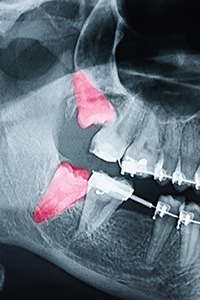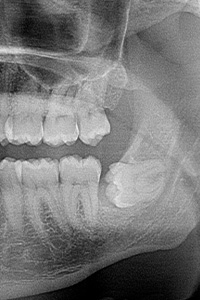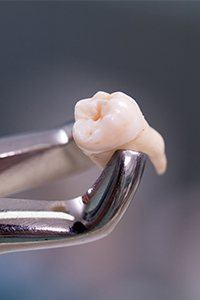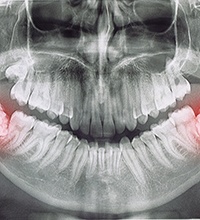Wisdom Tooth Extractions • Prosper, TX
Stress-Free Wisdom
Tooth Removals

Some people will never have to remove their wisdom teeth even though the growth patterns can be somewhat irregular. However, patients who do need their wisdom teeth removed but ignore the procedure for any period of time run the risk of developing several health complications. It is common for the wisdom teeth to negatively impact the adjoining teeth and cause various other conditions such as infections and even tumors, not to mention the impact they can have on someone’s overall health. Fortunately, patients in Prosper and beyond can get top-of-the-line wisdom tooth extractions right here at Texas Dental Surgery
Why Choose Texas Dental Surgery for Wisdom Tooth Extractions?
- Led by a Certified Periodontist & Oral Surgeon
- Locally-Owned Specialty Dental Office That Treats Patients Like Family
- State-of-the-Art Equipment & Multiple Sedation Options
What Are Wisdom Teeth?

The wisdom teeth are an extra set of molars that our caveman ancestors needed to chew the rough roots and meats that made up most of their diet. Back then, by the time a person reached their late teens or early twenties, the first molars would have normally been worn out or broken, which the wisdom teeth would replace. Over time, however, as food has become easier to eat, people’s teeth were able to last much longer, and the human jaw actually shrunk. As a result, most people simply don’t have enough room in their mouth for their wisdom teeth, which is why they are so often removed.
Impacted Wisdom Teeth

It’s relatively common for the wisdom teeth to become stuck while trying to come in, or impacted. In addition to causing pain towards the back of the jaw, impacted wisdom teeth can also create a flap in the gum line that easily traps plaque and food particles, dramatically increasing a person’s risk for developing cavities. They often require a surgical extraction in order to be removed, and thankfully, our team has performed this kind of procedure countless times before.
Wisdom Tooth Removal

In almost all cases, wisdom teeth are completely formed at 18 years of age. It is therefore recommended that the removal take place anywhere between the ages of 15 to 18. But, not all cases are the same, and through further analysis, the right time would be determined on a patient to patient basis. Often, a general or family dentist will be the first to discover an issue with the wisdom teeth - typically through X-rays during routine dental checkups. During the extraction, a patient will be numbed with local anesthetic, and then their doctor will remove any gum or bone tissue that is still encapsulating the tooth before removing the tooth itself. The treatment site would then be closed using self-dissolving stitches.
Wisdom Teeth Extraction Aftercare

After you’ve gone through your wisdom tooth removal at Texas Dental Surgery, a brief recovery process will follow. You may experience a certain level of pain and swelling in your jaw and face. This is completely normal and will subside after a few days. Generally, the recovery time is approximately three to four days, but it can sometimes take up to a week. We will prescribe the appropriate anti-inflammatories to help manage any pain, and we also recommend icing the affected area to help reduce swelling. You will receive a thorough recovery plan before your wisdom tooth removal takes place.
Understanding the Cost of Wisdom Tooth Extractions

The wisdom teeth may have been helpful for our early ancestors, but today they tend to do more harm than good. Many people don’t have enough room in their mouths to accommodate wisdom teeth, so they need to be removed. However, this procedure is often put off due to fear of cost. Everyone’s treatment is a little bit different, so the cost can vary. During your consultation, we will discuss the exact cost of your treatment. Until then, here’s what you should take into consideration.
Factors That Can Impact the Cost of Wisdom Teeth Extractions

The cost of wisdom tooth extractions varies. Here are some of the factors that have the greatest influence:
- Number of Teeth: Some people don’t develop all four of their wisdom teeth and others don’t need to have all four of their wisdom teeth extracted. When we examine your smile, we will determine the best solution.
- Impaction: If you have wisdom teeth that are impacted, the procedure is more complicated. This can lengthen the treatment time, increasing the cost.
Does Dental Insurance Cover Wisdom Tooth Extractions?

Wisdom tooth extractions are considered to be a major restorative treatment, so the cost is generally covered at about 50% by dental insurance providers. However, everyone’s plan can vary, so it’s best to reach out to your provider ahead of time to learn the details of your coverage so you don’t run into any surprises. We are proud to be in-network with Cigna, Delta Dental, Dentemax, and many more plans. We also accept out-of-network plans. If you have questions regarding your coverage, give us a call.
How to Make Wisdom Tooth Extractions Affordable

If you don’t have dental insurance, this doesn’t mean that you are completely out of luck. We are happy to accept payments through CareCredit and Lending Club. These third-party financing companies can split the cost of your treatment into manageable monthly installments with little to no interest. If you need help applying, one of our friendly team members would be happy to assist you.
Wisdom Teeth FAQs
How Can I Tell if I Need Wisdom Teeth Extractions?
It’s best not to wait until you experience wisdom teeth-related symptoms before you ask a dental professional about getting them removed. Simply visit your dentist every six months, and they will check on your wisdom teeth to see whether they are beginning to cause you problems or they may do so in the future. If you do experience discomfort that is related to your wisdom teeth, you should schedule a dental visit as soon as possible.
What Risks Are Associated with Wisdom Teeth Extractions?
Complications related to wisdom tooth extractions are rare, but they do occur in some cases. The most common complication is known as dry socket, wherein there is no blood clot at the extraction site to protect it. This can happen if the blood clot gets dislodged, or if it fails to form in the first place. You can reduce your risk of dry socket by not smoking, avoiding the use of straws, and carefully following any other postoperative instructions that we give you.
Should I Get All of My Wisdom Teeth Removed at Once?
Some patients request to have all of their wisdom teeth removed at once, even if only one or two of the teeth are causing a problem. If you would like to get all of them removed as a preventive measure, feel free to talk to us about your wish. We’ll discuss the pros and cons of the procedure with you so you can make a fully informed decision.
I’m Afraid of Getting My Wisdom Teeth Removed. How Can You Help?
We place a high priority on patient comfort, which is why we are one of the few dental offices in our area to offer IV sedation. This powerful form of sedation can help you remain completely relaxed while we work to remove your wisdom teeth. We also offer a milder form of sedation in the form of nitrous oxide.
I’m a Bit Older. Is It Too Late to Get My Wisdom Teeth Removed?
Wisdom tooth extraction usually occurs when an individual is a teenager or young adult. However, there is no real age limit on the procedure. It may be a more complex surgery for people in their 30s, 40s, or older, but our skilled team is fully capable of handling such cases.

